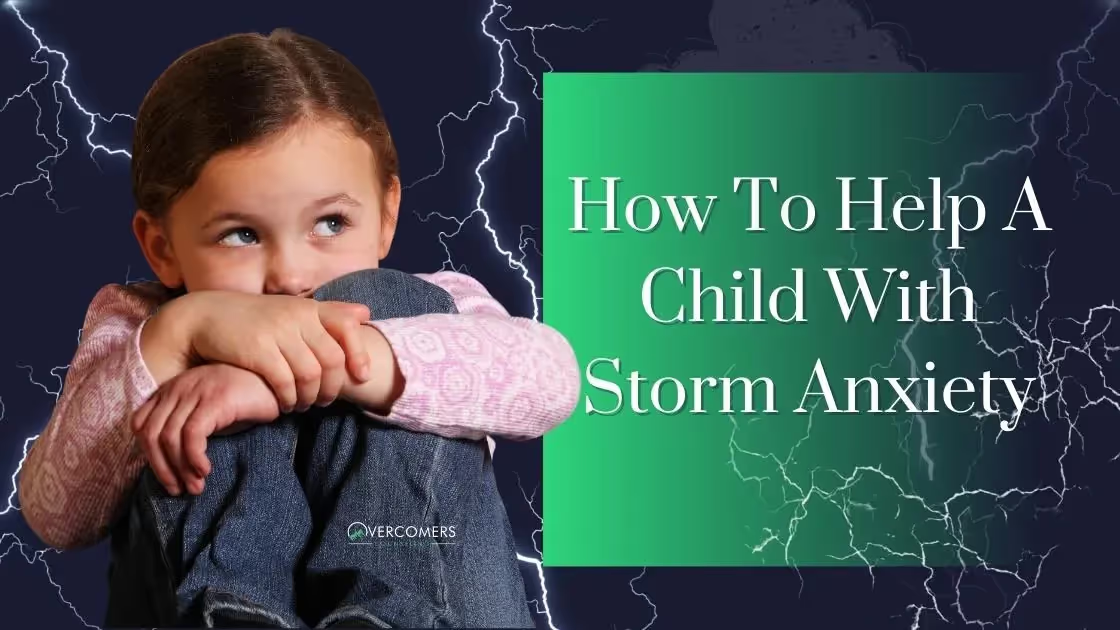If your child is anxious about storms, there are a few things you can do to help them feel more comfortable.Identify what triggers their anxietyIs it the...

If your child is anxious about storms, there are a few things you can do to help them feel more comfortable.
Is it the sound of the wind? The sight of dark clouds?
Once you know what it is, you can start to work on addressing that particular fear.
If the problem is the sound of the wind, for example, you might try playing a piece of soft music to help drown out the noise.
If the problem is the sight of dark clouds, you might try using blinds or curtains to block out the view.
Ultimately, the goal is to help your child feel safe and secure during a storm.
With a little patience and effort, you can help them overcome their fears and enjoy storms just like everyone else.
This is an important step in learning how to help a child with storm anxiety.

One way to help your child feel better during a storm is to make a playlist of calming songs for them to listen to.
You can include songs with slow, soothing melodies and lyrics that talk about the beauty of nature.
You can also read stories together that feature characters who calmly weather storms.
These stories can provide a sense of comfort and reassurance to your child that they are not alone in feeling anxious during a storm.
You can also help to calm your child by talking to them about the science of storms.
Explain how thunder and lightning occur, and reassure them that the noise is not harmful.
By taking these steps, you can help your child to feel more comfortable and safe during a storm.
When finding strategies for how to help a child with storm anxiety, music is a great option.
As a parent, it can be difficult to watch your child go through a tough experience like a storm.
You may want to protect them from the storm or make it all go away.
While you can't control the weather, there are things you can do to help your child deal with the feelings of fear and anxiety that come from storms.
One way to help is to talk about the storm together.
This can help your child understand what is happening and why they might be feeling scared.
You can also help by teaching your child some calming techniques, such as deep breathing or visualization.
If your child is old enough, you can even practice these techniques together.
By taking these steps, you can help your child and in the process learn how to help a child with storm anxiety.
Being patient with your child during a storm can be difficult, but it is important to understand that this is a scary time for them as well.
Children may not understand what is happening and why the weather is so severe.
It is important to talk to them calmly and explain what is happening in a language they can understand.
Reassure them that you are there and that you will keep them safe.
Let them know it is okay to feel scared and offer comforting words and hugs.
Most importantly, be patient with your child and let them know that this is a difficult time for you as well.
They need to feel like they are not alone in this experience.
One thing you can do is explain that storms are a natural phenomenon and that they pose no danger to the family.
You can also point out that the house is built to withstand high winds and heavy rain, and that you will be there to protect them if anything should happen.
If your child is old enough, you can also explain the science behind storms, such as why thunder occurs or why the sky turns dark.
Explaining the natural phenomena is a positive way to educate yourself on how to help a child with storm anxiety.
By helping your child to understand storms, you can help to ease their anxiety and provide them with a sense of comfort and safety.
The loud thunder and bright lightning can be scary, and the thought of being caught in a downpour can be overwhelming.
However, there are ways to help children cope with storm anxiety. One approach is to focus on the positive aspects of storms.
For example, you can point out the sound of rain or the beauty of a rainbow.
Helping children to see storms in a positive light can make them less anxious and more likely to enjoy them. Another approach is to provide reassurance.
Letting children know that they are safe and that you are there to protect them can help to ease their fears.
With a little patience and understanding, you can help your child overcome storm anxiety and enjoy the natural beauty of a storm.

As a parent, it's only natural to want to protect your child from harm. However, when it comes to storms, it's important to avoid using negative language. Words like:
These words can increase your child's anxiety and make it harder for them to cope with the storm.
Instead, try to focus on the positive aspects of the storm, such as the wonderful sound of the rain or the dazzling display of lightning.
By framing the storm in a positive light, you can help your child to feel more comfortable and relaxed.
If your child's anxiety is beginning to interfere with their ability to function normally, it may be time to seek professional help.
A therapist can teach your child healthy coping mechanisms and help them to view anxiety in a more positive light.
In some cases, medication may also be recommended.
However, it is important to remember that every child is different, and what works for one may not work for another.
The most important thing is to find a treatment plan that helps your child to feel more comfortable and confident.
With the right support, your child can learn to manage their anxiety and enjoy a more peaceful life.
Anxiety is a natural stress response, and it can be especially intense in children.
If your child is struggling with storm anxiety, there are ways that you can help.
By providing reassurance, explaining storms in a positive light, and avoiding negative language, you can help your child to feel more comfortable and relaxed during bad weather.
If the anxiety is causing significant distress or preventing your child from functioning normally, it may be time to seek professional help.
With the right support, your child can learn to manage their anxiety and enjoy a more peaceful life.
The duration of anxiety counseling varies for each individual, depending on the severity of their anxiety and their progress in therapy. Our therapists will regularly assess your progress and adjust your treatment plan as needed.
Addressing anxiety is crucial because it can significantly impact your quality of life and overall well-being. Left untreated, anxiety can lead to more severe mental health issues, relationship problems, and difficulty functioning in daily life.
It's important that you feel comfortable discussing personal matters with your therapist in order to open up and get more out of therapy sessions; therefore finding someone who meets certain criteria like experience level, expertise areas, and personality is key when selecting a therapist who can give meaningful feedback about how best handle issues related to anxiety or other mental health concerns.
Other activities which have been found helpful in reducing both immediate feelings of anxiousness and long-term anxieties associated with chronic disorders include yoga, journaling, nature walks, art therapy, volunteering, and other low-stress activities. Additionally, developing a healthy lifestyle incorporating adequate sleep, physical activity, and nutritious meals can help reduce overall stress levels.
To reduce your anxiety, you can practice relaxation techniques such as deep breathing, progressive muscle relaxation, guided imagery, and mindfulness practices. Additionally, regular exercise has been found to be beneficial in managing stress and improving mental health.
Yes, Medicaid provides insurance coverage for therapy services specifically designed to help individuals struggling with anxiety, depression, and other mental health conditions.